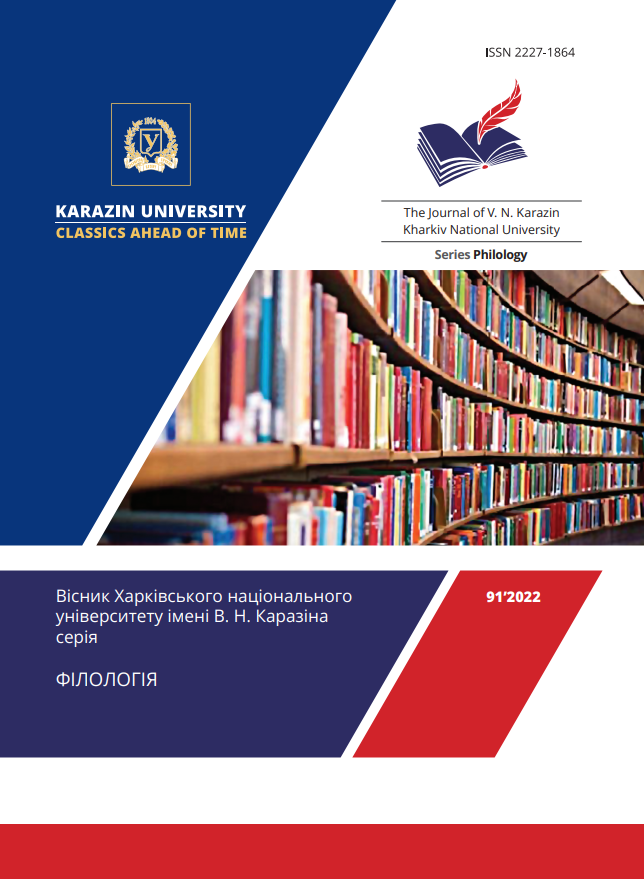Skovoroda and Horace in The «Garden of Divine Songs»
Abstract
The article examines the images and motives of Horace, reinterpreted by Hryhoriy Skovoroda: dangers, a pure heart, a traveler in search of happiness. The mechanism of Ukrainian Socrates transfer of certain elements of Horace's ode «To Aristius Fuscus» and To «Pompey Grosphus» from the ancient soil to the plane of the Holy Scriptures was studied.
The 20th canto of «The Garden of Divine Songs» and the ode «To Aristius Fuscus» are shown to unfold the motif of danger in different ways. The Ancient author presents it as physical (wolf, lion), and the Ukrainian philosopher presents it as spiritual (slander, slander). According to both, purity of soul is the key to victory. For Horace, this thesis is superficial, the exoticism of the adventure described in the work is more important to him. According to the Ukrainian Socrates, the purity of the soul is the guarantee of its eternal salvation, to which the named song is dedicated.
As for the 24th song of «The Garden of Divine Songs», it echoes Horace's ode «To Pompey Grosf». Both works philosophically interpret the topic of happiness. It is noted that for Horace moderation in wealth is a guarantee of happiness, and for Hryhoriy Skovoroda it is only a condition. In contrast to the ancient thinker, the Ukrainian believes that the key to happiness is a «small soul», not burdened by pride and excessive desires. Hryhoriy Skovoroda unfolds the motives of Horace, keeping the possibility of a double interpretation of the most important passages of the text.
The works of the baroque author not only glorify the ideas. They have the direct elements of a song: choruses, rich sound writing and rhymes, and a fixed stanza structure.
Downloads
References
Antofiichuk V. (2016) Indifferens and differens of the genre field of religious poetry (prayer—religious hymn—psalm) // Stepladder of Yakov: a collection of articles in honor of Professor Leonid Ushkalov on the occasion of his sixtieth birthday. Compiled by N. Levchenko; scientific editor R. Melnykiv. Kharkiv: Maidan. 490 p.
The Bible. Ukrainian Bible — Ohienko (1962). URL: https://www.wordproject.org/bibles/uk/index.htm (access date 06/29/2022).
Horace K. F. (2021) Odes. Epods. Satires. Letters. Trans. from the Latin of A. Sodomora. Lviv: Apriori. 432 p.: ill.
Danylenko I. I. (2008) Prayer as a literary genre: genesis and evolution: Monograph. Mykolaiv: Department of the Mykolaiv State University by Petro Mohyla. 304 p.
Zosim O. L. (2017) East Slavic spiritual song: sacred dimension: monograph. Kyiv: NAKKKiM. 328 p.
Merkulov M. (2016) Ancient images in the works of Ukrainian writers of the Baroque era (based on the poems of Hryhoriy Skovoroda and Feofan Prokopovych). URL:
https://il-journal.com/index.php/journal/article/view/271/156 (access date: 06/29/2022).
Skovoroda H. (2016) Complete academic collection of works / Hryhoriy Skovoroda; under the editorship Prof. Leonid Ushkalov. 2nd ed., pp. Kharkiv: O. O. Savchuk Publisher. 1400 p.
Ushkalov L. (2002) A few remarks about the place and role of ancient culture in the work of Hryhoriy Skovoroda // Hryhoriy Skovoroda and ancient culture: Abstracts of the reports of the scientific and practical conference dedicated to the 280th anniversary of the birth of H.S. Skovoroda (November 19, 2002). Kharkiv. P. 3—5.
Ushkalov L. (1993) The opposition «antiquus—modernus» on the terrain of the Ukrainian literary baroque // Collection of the Kharkiv Historical and Philological Society: New Series. Kharkiv: Eye. Vol. 1, pp. 93—104.
Franko I. (1977) To Aristius Fusk // Franko I. Collection of works in 50 volumes. Vol. 9. Poetic translations and re-singing's. Kyiv: Scientific opinion. 528 p. 394—395.
Chyzhevsky D. (2003) Ukrainian literary baroque. Selected works from ancient literature. Kyiv: Сharms. 576 p.
P. 107.
Chotari V. (2009) The genre of the psalm: genesis, adaptation, transformation: autoref. Dis... Cand. philol. Sciences: 10.01.06. Ternopil National Pedagogical University by Volodymyr Hnatiuk. Ternopil. 19 p.
Shevchuk. T. (2010) Satirical motifs in the work of the poets of «the rhetorical era» (Horatio—Shakespeare—Skovoroda) // Scientific Notes. Series «Philological». Vol. 15. Ostroh. P. 347—355.




